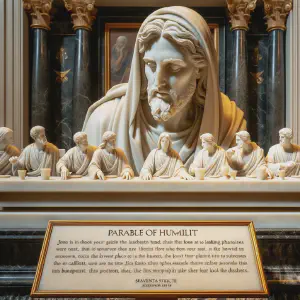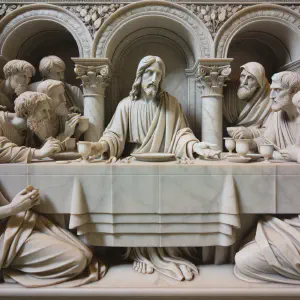The Banquet of Lessons



Finally, the narrative takes us to a different scene, a Sabbath meal at the home of a leading Pharisee where Jesus is a guest. Observing the guests’ choice of seats, Jesus shares a parable, a lesson in humility. He advises choosing the lowest place at a banquet, for in doing so, one may be honored by being asked to move higher. This simple yet profound lesson encapsulates the day’s teachings: humility leads to exaltation, and God’s love and promise encompass all, inviting everyone to the banquet of His eternal kingdom.
Five Questions
What is the significance of Paul’s assertion that God has not rejected His people, Israel?
Paul’s assertion emphasizes the continuity and faithfulness of God’s covenant with Israel. Despite appearances or contemporary challenges, God’s promises remain steadfast. This is a powerful reminder of God’s enduring commitment, not just to Israel, but to all who are brought into His plan of salvation. Paul’s message is one of hope and inclusion, asserting that God’s love and promises are irrevocable, and extend beyond the immediate circumstances.
How does the story of Elijah relate to Paul’s message in the reading from Romans?
Elijah’s story, where he pleads with God against Israel, is referenced by Paul to highlight a key point: even when it seems like Israel has turned away from God, God’s commitment to them doesn’t waver. Paul uses this to illustrate a larger pattern in God’s relationship with His people – a pattern of faithfulness and redemption, even in the face of transgression. This underscores the idea that God’s plans are mysterious and often beyond our immediate understanding, yet always grounded in His steadfast love and mercy.
In the Gospel of Luke, why does Jesus choose a wedding banquet to teach about humility?
The setting of a wedding banquet is culturally significant and relatable, serving as an effective metaphor for social dynamics and the Kingdom of God. In this context, Jesus uses a common social situation to teach a deeper spiritual truth. By advising guests to take the lowest place, He illustrates the Kingdom value of humility over societal status. The parable teaches that in God’s eyes, humility is honored and self-exaltation is discouraged. This aligns with the overarching biblical theme that God elevates the humble and humbles the proud.
How does Psalm 94 complement the themes presented in the readings from Romans and Luke?
Psalm 94 provides a reassuring chorus to the themes presented in Romans and Luke, emphasizing God’s unfailing support and justice. It echoes the idea of God not abandoning His people, resonating with Paul’s message of God’s enduring covenant with Israel. The Psalm also speaks to personal humility and reliance on God, aligning with Jesus’ teaching in Luke. It reassures believers that in times of trial or when feeling overwhelmed, God’s mercy and justice are constant sources of support and salvation.
What overarching message can we derive from these scripture readings?
The overarching message from these scriptures is one of divine faithfulness, inclusivity, and the transformative power of humility. God’s steadfast love and promises encompass both Israel and the Gentiles, illustrating the universal scope of His salvation plan. Humility, as taught by Jesus, is key to understanding and participating in this plan. These readings collectively teach us to trust in God’s mysterious ways, to embrace humility in our lives, and to recognize the wide embrace of God’s redemptive love for all humanity.
Bible Study
Romans 11:1-2a, 11-12, 25-29
Brothers and sisters:
I ask, then, has God rejected his people? Of course not!
For I too am a child of Israel, a descendant of Abraham,
of the tribe of Benjamin. God has not rejected his people whom he foreknew.
Do you not know what the Scripture says about Elijah,
how he pleads with God against Israel?
Hence I ask, did they stumble so as to fall? Of course not!
But through their transgression salvation has come to the Gentiles,
so as to make them jealous. Now if their transgression is enrichment for the world,
and if their diminished number is enrichment for the Gentiles,
how much more their full number.
I do not want you to be unaware of this mystery, brothers and sisters,
so that you will not become wise in your own estimation:
a hardening has come upon Israel in part,
until the full number of the Gentiles comes in,
and thus all Israel will be saved, as it is written:
The deliverer will come out of Zion,
he will turn away godlessness from Jacob;
and this is my covenant with them
when I take away their sins.
In respect to the Gospel, they are enemies on your account;
but in respect to election,
they are beloved because of the patriarch.
For the gifts and the call of God are irrevocable.
Paul, an apostle and early Christian leader, speaks here about the continuity of God’s plan for Israel and the inclusion of the Gentiles. This passage aligns with Catholic teachings on God’s universal salvation and the unbreakable nature of His covenants, as found in the Catechism of the Catholic Church. It reflects the themes of divine mercy and the mystery of God’s plan, resonating with Catholic values of faith in God’s promises and the universal call to salvation.
Psalm 94:12-13a, 14-15, 17-18
Blessed the man whom you instruct, O LORD,
whom by your law you teach,
Giving him rest from evil days.
For the LORD will not cast off his people,
nor abandon his inheritance;
But judgment shall again be with justice,
and all the upright of heart shall follow it.
Were not the LORD my help,
my soul would soon dwell in the silent grave.
When I say, “My foot is slipping,”
your mercy, O LORD, sustains me.
This Psalm reflects the Catholic understanding of God as a teacher and protector, who guides and sustains His people. The emphasis on divine instruction and mercy aligns with the Catholic focus on God’s law as a path to righteousness and His enduring presence in times of trial. This Psalm upholds the Catholic values of trust in God’s justice and mercy, and the importance of living a life aligned with God’s teachings.
Luke 14:1, 7-11
On a sabbath Jesus went to dine
at the home of one of the leading Pharisees,
and the people there were observing him carefully.
He told a parable to those who had been invited,
noticing how they were choosing the places of honor at the table.
“When you are invited by someone to a wedding banquet,
do not recline at table in the place of honor.
A more distinguished guest than you may have been invited by him,
and the host who invited both of you may approach you and say,
‘Give your place to this man,’
and then you would proceed with embarrassment
to take the lowest place.
Rather, when you are invited,
go and take the lowest place
so that when the host comes to you he may say,
‘My friend, move up to a higher position.’
Then you will enjoy the esteem of your companions at the table.
For everyone who exalts himself will be humbled,
but the one who humbles himself will be exalted.”
In this passage, Jesus Christ, the central figure of Christianity, teaches about humility through a parable. This aligns with Catholic teachings on humility and service, as found in the Beatitudes and the Catechism. It emphasizes the value of humility, a core Christian virtue, reflecting the Catholic belief in the exaltation of the humble and the dangers of pride. This passage underlines the importance of humility in the Christian life, a key aspect of Catholic spirituality.
Lessons
These passages teach us about the enduring nature of God’s love and plan for all humanity. Paul emphasizes that God has not rejected His people, Israel, but through their transgressions, has opened the path of salvation to the Gentiles as well. This illustrates God’s inclusive love and the mysterious workings of His grace. The Psalm reassures us of God’s constant presence and guidance, even in times of trial. Lastly, Jesus’ parable in Luke teaches the virtue of humility, reminding us that those who humble themselves will be exalted. Together, these readings invite us to embrace humility, trust in God’s unfailing love, and recognize His plan for the salvation of all.
Meditation Prayer


